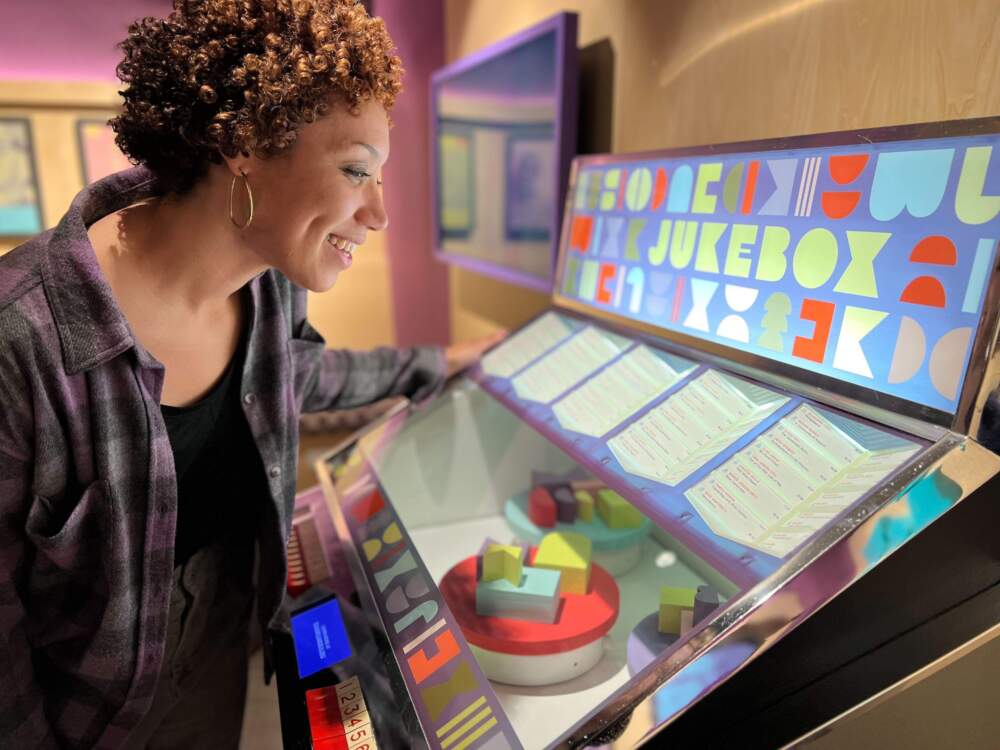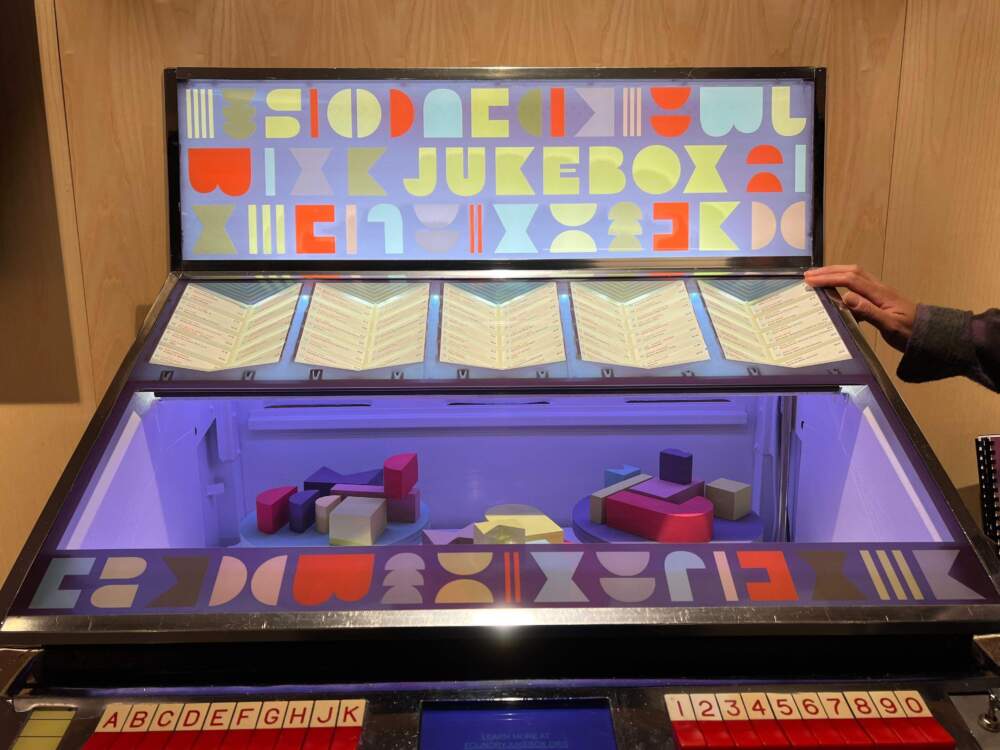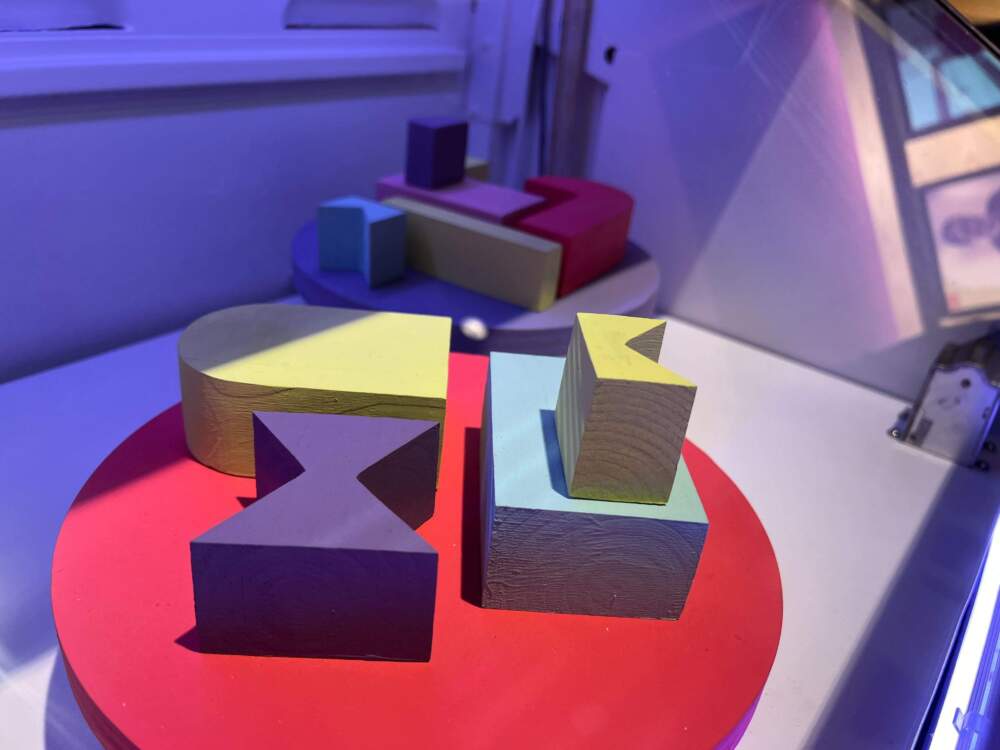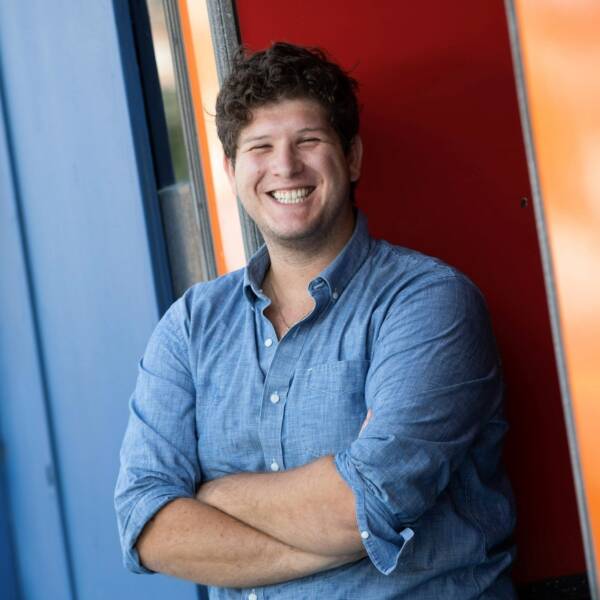Advertisement
Voices, not vinyl: Artist transforms a jukebox into a storytelling machine
Resume
Elisa Hamilton needed a jukebox.
The Boston-based artist had a concept for a public art installation — and what it would sound and look like — but first she required a piece of classic Americana to make it happen.
The search brought her to Garnick’s in Lowell. It’s a small shop that has sold many things since it opened in 1934, but nowadays it sells mostly records and retro jukeboxes. Dave Garnick, who had been working on jukeboxes since he was a child, sold her a 1960 Seeburg.
The machine was inoperable, and the inner cabinet had been emptied. “And that was perfect for me,” said Hamilton, who rebuilt the jukebox inside and out. She customized it to create Jukebox, a public art project commissioned by the Cambridge Arts Council for the Cambridge Foundry.
This jukebox operates like many others — press a combination of letters and numbers to select a corresponding track — but this jukebox differs from other music-playing machines in one significant way. Most jukeboxes play music. This one plays 100 stories from interviews conducted by Hamilton and the Cambridge Black History Project. "I never saw it as an oral history project until I was already making this. I came at this as an artist, creating a project about stories,” said Hamilton.
Each of the stories on Jukebox features the voice of someone from Cambridge throughout the decades. “[Listeners] can expect to hear stories about neighborhoods, about communities, about places that aren't in Cambridge anymore,” said Hamilton. “Joys and struggles … discrimination and overcoming discrimination … what it means to be a young person growing up in the world; in many cases, a young Black person growing up in the world.”

Hamilton added the latest installment of tracks to Jukebox last month and marked the occasion with a celebration at the Cambridge Public Library, which is where all of the interviews will be archived in their entirety.
People who lent their voices traveled from across the country for the event. One of the attendees, Linda Jackson Ezell, came all the way from Georgia.
In her Jukebox track, Ezell talks about the role school played while growing up in Cambridge. “I didn't want to miss a single thing going on in school,” her story plays. “And so, I was in the 7th grade, I got the whooping coughs, and I missed a whole week of school and I nearly died. The whooping cough might have been the thing to kill me, but missing school was surely going to kill me dead.”
In an interview with WBUR, Ezell spoke of the personal significance of knowing her story would be archived for future generations. “My mother was born in 1908. I am the genealogist in my family. And I just found her great-grandmother. And I know her name is Millie and she was a slave,” she said. “Now, wouldn't I love to be able to go online and just even see her face and hear her voice? I would love that. And I think that for my kids, my kids’ kids, … I just want them all to know their grammy.”

The machine sits in a purple-cushioned nook at The Foundry. Communications director Olivia Fone often sits at the welcome desk and noted reactions to the “seemingly musical device.” She wrote in an email: “I've seen the look of shock on their faces as they identified voices on the tracklist of people they've known for years, having no idea of their participation in the project.”
“I wanted people to come into this space and be curious and be just wrapped in community,” Hamilton said on a visit to the Foundry. She recruited a team of collaborators to realize her vision, from Karen Shanley of Goodgood who developed Jukebox’s visual identity and created the 100 Jukebox album covers, to the Foundry’s architects who helped achieve the warm and welcoming atmosphere. The Loop Lab mixed the audio on Jukebox, and Matthew Azevedo designed and built the computer that runs Jukebox in such a way that more tracks can be added alongside existing stories.
“When I think of somebody listening to one of these stories 50 years from now, 100 years from now, I imagine the world will have changed so much,” said Hamilton. “Even today, Cambridge is changing. I hope that listeners will take away what a special and unique place Cambridge was and continues to be.”
Listeners will hear stories about community, family, immigration and the people from throughout the decades who made Cambridge the place it is today. One track from Clyde Lindsay recounts the story of Frank Frisoli, a Cambridge public school teacher. “He was a wonderful guy, knew his business, never wasted time, always had time for you,” Lyndsay explains how Frisoli held unofficial office hours at a diner in Cambridge to help students from under-resourced schools apply to college. “He wasn't supposed to be doing that. It was against the rules for him to do that. Yeah, Frank Frisoli is one of the people who is a hero.”
Now, just as Frisoli made himself available to students to drop by and pick up some wisdom, his story and 99 others will have a new life in Jukebox. Hamilton sat in one of the booths at The Foundry, staring at the Jukebox as Lyndsay’s story played. Immersed in the sound of his voice, she said, “That story about Frank Frisoli feels like the epitome of the story that may have been lost, if not for this project.”
Jukebox is a free, permanent art installation at The Foundry in Cambridge. The stories featured on Jukebox can also be played online at FoundryJukebox.org.
This segment aired on January 31, 2024.
